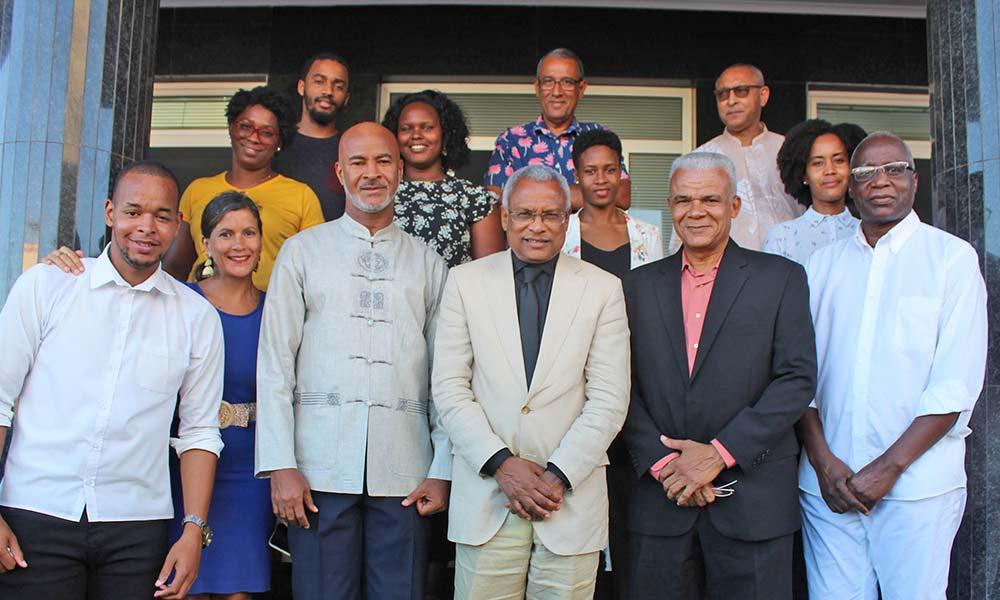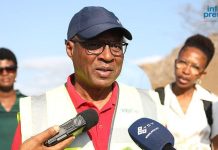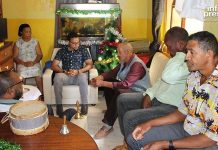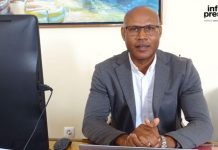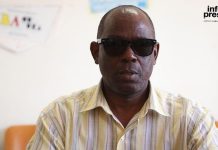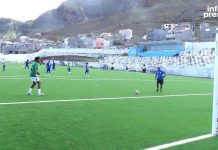Africa-Press – Cape verde. The President of the Republic, who visited the premises of A NAÇÃO yesterday, recognized the growth of the media sector in the country, highlighting the “great boldness” of the private sector, despite the constraints and challenges they face. In more than thirty years of democratic rule, this is the first time that a head of state has made such a visit.
N oven years after inaugurating the headquarters of Grupo ALFA, in Cidadela, Cidade da Praia, where A NAÇÃO operates, at the time as prime minister, the now President of the Republic returns to visit this newspaper, as part of the visit he made this Wednesday on the 27th, to the private media, as part of the World Press Freedom Day, which is celebrated on the 3rd of May.
problems and challenges
José Maria Neves, who visited other private bodies in the morning, leaving A NAÇAO for the afternoon, reiterated the need for a legislative framework more favorable to the development and affirmation of these means. JMN was accompanied by its Chief of Staff, Jorge Tolentino, as well as advisors.
“The problems and challenges are the same for the private press to assert itself. What is needed is an environment that is much more friendly to the private sector”, he defended to A NAÇÃO.
“We will only have a higher quality democracy and an intellectual ecosystem capable of contributing to accelerate the pace of Cape Verde’s transformation process, we will only have much more spiritual vigor in the country if we consolidate the private media sector”, he added.
JMN considers that the service provided by the private media is of “public utility”, hence defending that it is necessary to guarantee support, within the framework of a strategy of qualification of Cape Verdean democracy and politics, as well as the qualification of public policies for the development from the country.
“Great boldness” of the private media
Regarding the exercise of journalism, currently practiced in the country, the head of state not only praised the “great boldness” that the private sector has shown in approaching certain issues, but also its daring, courage and even “great capacity to resilience”.
This takes into account the scarce existing market, “bringing more people and improving the quality of services provided to society”.
“Of course, there are enormous constraints, namely in terms of the sustainability of these bodies, and there is also a need to consolidate that pluralism that must exist in the Cape Verdean media”, he added.
Fighting censorship and self-censorship
On the issue of censorship, more specifically self-censorship, several times pointed out by the entities that monitor press freedom in Cape Verde, the Head of State acknowledged that there is “some fear” in the media, in general, also warning that “there are publics that are the largest in the country, excessively governmentalized”.
JMN also stated that “there are complaints and all reports of self-censorship” but that this happens because, in the country, there is still “an excessive dependence of society and citizens on the State”, also referring to “companies, public bodies and of social communication, etc.”.
“We need to free ourselves from the restrictions that the State still places on society and citizens. Empowering society and citizens, we will have more sustainable governance and more democracy in the country,” he concluded.
It should be remembered that these PR visits to private bodies, based in Praia, are part of a series of direct contacts with the communication sector within the scope of the World Press Freedom Day.
An opportunity he considers “unique” to learn about the “concerns and major challenges” facing the development of the private media sector, which, over the years, has played “an important role in the country”.
First time
Yesterday’s visit, Wednesday, 25th, included private television stations (TVA, TIVER and RECORD), radio stations (Crioula FM and Comercial), and newspapers (Expresso das Ilhas and A NAÇÃO).
In 31 years of democratic rule, this is the first time that a head of state has made such a visit to the private media.
Fernando Ortet “expectant” in the support that PR can provide to private media
The president of Grupo Alfa, Fernando Ortet, says he is “very hopeful” in the power of influence that the President of the Republic may have in solving some “structuring” problems facing the private media sector in Cape Verde.
“We know that it is not the Government, but we believe that it has the possibility of raising awareness, influencing and helping us to overcome the existing challenges”, he said, following the visit by José Maria Neves, yesterday, to the premises of the newspaper A Nação, which part of Grupo Alfa, in Cidadela.
Fernando Ortet, who is also president of the Private Media Association of Cape Verde (AMPCV), expressed that he was satisfied with the PR visit, which took place at a time when the major problem facing the sector has to do with its sustainability. financial, taking into account that the bulk of the resources, namely advertising, goes entirely to the public media.
However, he defended, “all of us – from the state and private media – work for the public sphere, to better inform Cape Verdeans, to strengthen democracy, and to increase the degree of citizenship of our people”.
“We know that the private media will not be able to cover all the islands, all the municipalities and all the corners of the country, because they do not have the resources. But we believe that if the State makes 10 to 15 percent (%) of the resources it makes available to public bodies available to the private media, the quality of information and democracy will improve in a way that will be perceptible to all”, he concluded. .
“The NATION needed to adapt to survive the pandemic” – Fernando Ortet
On the sidelines of the visit of the President of the Republic to the editorial office of our newspaper, the president of Grupo Alfa addressed the fact that A NAÇÃO has not been published in paper form since the time of the pandemic, as desired by many readers.
“There was a situation of the pandemic in which we are officially having recoveries, but still with many precautions. In fact, taking into account the reality, at the time, between closing and starting to produce in digital, we opted for this second option. Thanks to this decision, we managed to survive.”
However, says Fernando Ortet, even with the end of covid-19, the old problems with transport, whether from abroad to Cape Verde or internally, continue. As the newspaper was printed in Portugal, transported by plane to Praia, and from Praia to the other islands, the costs of these two factors increased greatly, in fact they increased by more than 400%.
“In addition, we still do not have regular transport between the islands”, recalled Ortet, for whom, without solving certain bottlenecks, “it is not worth making a paper weekly and then not reaching users in good time”.
From a financial point of view, Ortet says that A NAÇÃO had to do its “heart guts” to be able to face certain difficulties, taking into account that it has been two years since the newspaper stopped being placed on newsstands. However, from the point of view of the newspaper’s public recognition, even in the digital one, it is by far greater.
“Before the pandemic, with a total of 3,500 copies in print, we could only have an average reach of 7,000 people, at best. Today, with digital, on the same day, at the same minute, we managed to put the newspaper all over the world, for all those who are interested in knowing what is happening in Cape Verde. We distribute the same content as the printed newspaper, in PDF format, to more than 15,000 readers. Also, this is a general trend, worldwide,” he explained.
However, in the midst of all this, “it is necessary to know that the newspapers, particularly A NAÇÃO, made a very big financial effort not only to survive, continuing to pay their employees, but also to adapt to the new reality imposed by the covid-19. 19, which is still not completely out of date. For our part, we will continue to monitor the situation and see how to act when the time is right”.
In the meantime, Grupo Alfa continues to invest in new projects. One of which is a radio station, Rádio Alfa, which is scheduled to start in September.
For More News And Analysis About Cape verde Follow Africa-Press

